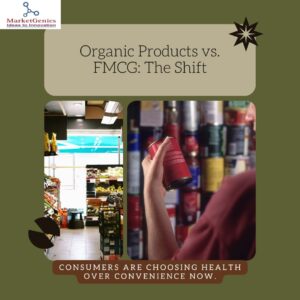The present-day commercial industry is seeing the rise of organic products as a significant threat to the traditional FMCG sector. As people are getting aware, have started prioritizing health, sustainability, and transparency in their purchasing decisions, FMCG companies need to navigate a rapidly changing landscape. Let’s dive into the organic movement and its effect on the FMCG industry, supported by recent research and market analysis.
The organic product market has experienced a significant growth in the past 10 years. According to the Organic Trade Association (OTA), USA, organic products sales has reached $62 billion in 2020 which is roughly a 12% rise from 2019. This trend is not limited to food but also organic personal care products such as lipsticks, lotions, shampoos, etc. Many new organic brands are flourishing in the market indicating an increase in demand and broader consumer shift towards organic options.
Now, looking at the Indian market, the Indian organic food market is subject to experience a robust growth, with a projected CAGR of 22.20% during the forecast period of 2024-2032. Moreover, the research shows that younger generation, particularly the Millennials and Gen Z, are more inclined towards organic products than FMCG. A Nielsen survey shows that 73% of Millennials are willing to pay more for organic goods.

The growing popularity of organic products has posed a direct threat to the established FMCG brands. As per the report by the McKinsey & Company, the traditional FMCG companies have experienced a 4.5% decline in market share from 2018 to 2022, while organic products sector grew by approximately 15.3% in the same time frame. This shift shows the consumers shift towards healthier options, forcing FMCG companies to re-evaluate their product offerings.
The organic products market has lower competition as compared to FMCG. There are less barriers to entry in the commercial space, allowing small and innovative brands to flourish. Most Organic companies have adopted a direct-to-consumer marketing strategy through digital platforms, enhancing their visibility and reach which is not only cost effective but only sustainable. Organic brands also enjoy higher consumer trust as compared to FMCG products. As consumers have become aware and demand more information about where their products come from, FMCG companies must prioritize transparency to retain market share.
Various Researches conducted on the sustainability of organic products have shown that organic farming can reduce carbon emissions by upto 40% compared to conventional methods. Also, Government policies are increasingly favoring organic agriculture by implementing subsidies and support programs, further threatening FMCG companies.
To alleviate the threat posed by organic products, FMCG companies should consider the following strategies:
The rise in awareness among consumers has surely put a significant threat to the FMCG sector leading to increase in the demand of organic products but the FMCG sector can still grow if they diversify their product offerings and emphasize on transparency and sustainability. If the FMCG sector continues to fail to do so, it may result in diminished market share and relevance. As the organic movement continues to gain popularity, the FMCG sector must evolve to meet the changing demands of the new generation of aware consumer.

© 2025 MarketGenics India Pvt Ltd.; All rights reserved